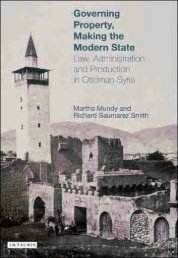The Young Turk Period, 1908-1918 - PSI424
The Young Turk Period, 1908-1918 - PSI424
The Young Turk Period, 1908-1918 - PSI424
You also want an ePaper? Increase the reach of your titles
YUMPU automatically turns print PDFs into web optimized ePapers that Google loves.
300 <strong>The</strong> Rise of Modern <strong>Turk</strong>ey, 1808-1975<br />
penetrating intelligence, forceful when necessary but never fanatical or vengeful." 99<br />
Cemal's role in suppressing the opposition stamped him as a skillful professional<br />
soldier, absolutely ruthless and without pity when dealing with enemies. Enver,<br />
finally, was the soldiers' soldier, the people's hero, quick, energetic, courageous,<br />
loyal to his colleagues and friends, honestly patriotic and devoted to the nation, a<br />
good soldier and an extremely able administrator. Together their talents brought<br />
them to almost absolute power within the councils of state, particularly after the<br />
empire was once again engulfed in war.<br />
<strong>The</strong> program of the CUP was clearly set out in its congress declarations made<br />
almost annually until 1913. Government was to be made more efficient by the<br />
"extension of responsibility" of individual bureaucrats, giving them the authority to<br />
act without having to secure authorization for every move from superiors, and by<br />
the "separation of duties" among the different bureaus, departments, ministries, and<br />
individual officials of the central government and between it and the equivalent<br />
provincial bodies. <strong>The</strong> nation was to be given economic independence, the Capitulations<br />
abolished, and foreigners made subject to the same laws as Ottomans so that<br />
the government could develop financial and economic policies related to the empire's<br />
good and not that of the foreign powers. <strong>The</strong> Parliament was to be given more<br />
power, and both the deputies and notables were to receive higher salaries. Deputies<br />
who were members of the administration or the police would have to resign before<br />
entering the Parliament to ensure their independence in policy making. Greatly<br />
increased low-interest loans were to be made available to cultivators to help the<br />
advance of agriculture, and they were to be allowed to form their own cooperatives<br />
and other organizations to protect themselves in marketing their goods. Artisans<br />
were to be allowed to protect themselves by developing their guilds into craft<br />
unions. <strong>The</strong> tithe was to be reduced once again to no more than one-tenth, with the<br />
surtaxes ended and education and public works financed from other sources. <strong>The</strong><br />
tax farm system was to be abolished once and for all and the profits tax extended<br />
into a full-fledged income tax so that all would share in the burden of government<br />
according to their means. <strong>The</strong> animal taxes were to be reduced and imposed only<br />
when the cultivators could pay in cash rather than being forced to surrender their<br />
animals in payment. Efforts also were to be made to improve animal husbandry, to<br />
develop industry and trade, and to facilitate the formation of corporations. Above<br />
all, the government would have to be reorganized and systematized. All corruption,<br />
favoritism, and protection were to be ended. <strong>The</strong> communes (nahiye) would be<br />
allowed to develop their own police, education, and public works according to local<br />
needs. Strong efforts were to be made to develop public health and to wipe out the<br />
diseases that had so troubled the population. Municipalities were to be given sufficient<br />
money to meet local needs without calling on the central government for help.<br />
Private, religious, and foreign schools were to be supervised by the government and<br />
elementary education made free and compulsory, with <strong>Turk</strong>ish used in all schools<br />
in order to promote the unity of Ottoman society. More teachers were to be trained,<br />
and they would go where they were needed in the countryside rather than remaining<br />
in the big cities. Students and teachers who excelled in their work were to receive<br />
salary supplements and bonuses as further encouragement. <strong>The</strong> religious schools<br />
were to be reformed to meet the needs of the modern world and new arrangements<br />
made to support the religious and cultural institutions previously maintained by<br />
foundations. Foreign experts would be brought to the empire as needed to help<br />
develop the higher technical academies and schools. 100












